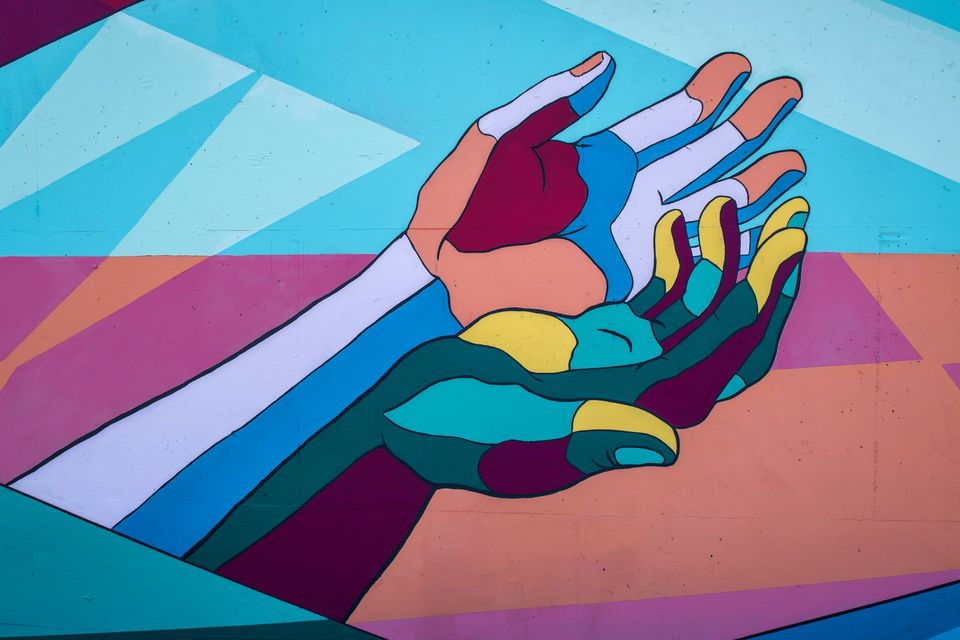Human(e) Thought Leadership: How to Be the Change for the Common Good Through Self-Mastery

A single person can make a difference in the world, but they can't do it alone without a community of 'thoughtful' leaders.
One morning, I had a flash of insight: I know how to be the change that I want to see in the world! I realized I’ve been developing and sharing these strategies for the common good for quite some time. Transformative change at the personal growth level requires patient, focused, and dedicated practice. Evolutionary social change, on the other hand, takes more substantial and organized practices than a single person can manage on their own.
What’s missing from potentiating this change I envision is you — meaning, the work we can do collectively to make the common good more humane, more accepting, and more understanding. This is not about the acceptance of identity labels, but rather, the acceptance of universal human dignity.
Listen or watch the Think Queerly Podcast:
I Envision a World that Respects All Humanity
To lead yourself from such a noble place — as if that place already existed — you will need to practice and embody values, principles, and beliefs that support universal human dignity.
However, I’m not suggesting a belief in a spiritual entity, following a religion, or a set of commandments. Instead, this is the personal responsibility of cultivating a loving, equitable, and harmonious humanity that — I believe — is both an individual and collective human responsibility. This is our ultimate, equitable endeavour.
For some time, I have been calling this path, The Way of Human-Heartedness — inspired by my study of over 10 translations of the Tao Te Ching. This ancient text is a non-dogmatic and non-religious way how to live mindfully with integrity and harmonizing with the natural order of things — without artificial and oppressive rules, or selfish desires for possessions, recognition, or power.
Human-Heartedness is a conscious practice, grounded in personal responsibility.
The practice of Human-Heartedness thoughtfully builds bridges that foster community and connection. Human-Heartedness prejudices no one and accepts every person wherever they stand in life, with the knowledge that we all come from the same source — nature. Our human nature is what connects us all.
The Way of Human-Heartedness is like a river that flows into the ocean. If we pollute the river with toxic chemicals — like blame, shame, division, inequity, prejudice, intolerance, racism, and hatred — the river will end up polluting the rest of the world. Multiple rivers feed into lakes and, eventually, the oceans.
“Higher good is like water:
the good in water benefits all,
and does so without contention.
It rests where people dislike to be,
so it is close to the Way.
— Verse 8, “The Essential Tao: An Initiation into the Heart of Taoism Through the Authentic Tao Te Ching and the Inner Teachings of Chuang-tzu.” Thomas Cleary.
Just as we can take a proactive approach to reduce and eliminate harmful environmental chemicals and waste that irrevocably harms the planet, we can also take active steps to remove the toxicity that plagues our hearts and minds. The result for our collective well-being is greater happiness, peace of mind, and personal freedom. Your personal transformation will positively impact others — like fresh river waters returning to the ocean and cleansing the source.
If You Don’t Have a Clear and Compelling Purpose, How Will Know What Direction to Take in Life?
“A journey of a thousand miles
Begins beneath the feet”
— Verse 64, “Tao Te Ching: Annotated & Explained.” Derick Lin.
Perhaps you have heard an alternative version of the quote above. Namely, “The journey of a thousand miles begins with a single step.” While this is a debate for translators of the Tao Te Ching, based on my extensive research the more likely version is the opening quotation — it makes the most sense. The verses of the Tao are rarely literal — they are often challenging, paradoxical, aphoristic, and highly metaphorical. They are early examples of critical thinking in practice.
Life is a journey.
If you are going to commit to a thousand-mile journey, you need to know where you are starting from and have a plan to reach your destination. There is no guarantee you will get there; you may change course on purpose or accidentally. Yet, if you are consciously aware of what you stand for — what you value and what you believe in — you will act with integrity in how you make decisions and interact with others along the journey of your life.
Think of it this way: when you know what you stand for, you have greater prediction and response in life.
You are better able to manage your emotions and choices when things get difficult. Your integrity is that authentic part of your true nature that you can rely on for support. In other words, integrity depends on knowing what you stand for, what you believe in, and why you hold those values to be true.
Is What You Stand for Making a Meaningful Difference?
If you don’t have a clearly defined and compelling purpose in life, how will know if your choices will move you in the right direction? You should not feel bad about not having a purpose. Nor should you compare your purpose to that of others. Everyone can make a difference, no matter how small.
It’s not the size that counts, it’s the intention.
When you know what you stand for, you will have clarity about what steps to take next. What grounds you are your beliefs, values, and character traits that act in solidarity with your purpose — like a GPS pointing you in the right direction, compelling you to move towards your intended goals.
Imagine a massive castle that has been around for hundreds of years. It’s beautifully maintained, and made of large, solid blocks of stone. The structure looks like it could withstand a hurricane without damage. What you don’t see are the foundations below, the heavy blocks of stone that support the structure’s integrity.
As humans, we have developed principles and qualities for how to act and behave that support our individual integrity. This allows us to function and interact with others in society, and to make a contribution to the greater good through our creativity and uniqueness.
What you stand for may lead you to align with a group — cultural, political, or religious. It may set you apart in a way that distinguishes you from others — which may or may not be polarizing. One of the aims of the Way of Human-Heartedness is to practice understanding for the conditions we create — consciously or inadvertently — and how those changes affect the common good, inclusion, acceptance, and equity.
What are the qualities that support your integrity?
To put the ideas behind this article into practice, I invite you to do a short, simple exercise to determine one part of what you stand for in life. There are many characteristics that define who we are and how we express our humaneness. For now, make a list of the qualities or characteristics that you aspire to or that you regularly demonstrate in your life. You don’t need to define the qualities or write an explanation — unless you want — you only need to name them. Grab a sheet of paper and write at least 10 qualities. This will take two minutes.
This list of qualities will come in useful for my next Personal Evolution Process. In it, I’ll discuss the characteristics we aspire to that influence our moral choices and affect humane leadership: "The Character Traits that Ground Who You Are — the Good and the Bad."





Member discussion